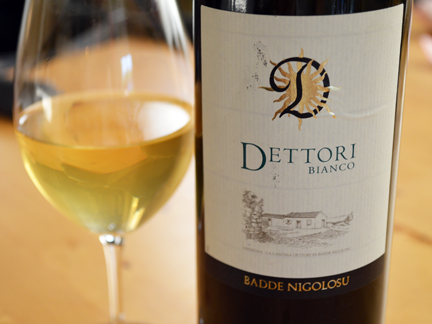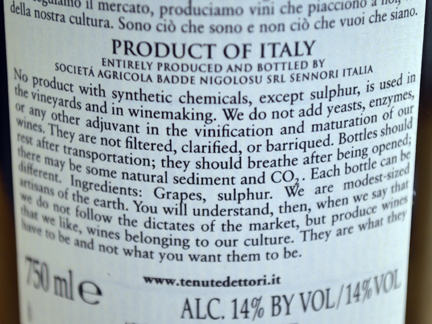“A writer takes his pen and writes the words again/all is fair in love.”
—Stevie Wonder
Above: Four of six bottles of Dettori 2010 Romangia Bianco have been fizzy and slightly sweet.
Dettori Romangia Bianco, a skin-contact wine from Sardinia made from 100% Vermentino grapes, is one of our all-time favorite wines.
Tracie P and I have a mini-vertical of the wine in our cellar and we buy a case of every new vintage to put down each year.
That’s just one of the reasons that I was so thrilled to see the wine finally make it to the Texas market (until now, I’ve bought the wine in California where I keep my cellar).
But the number-one reason was that we love drinking it.
Above: The Dettori back label with a note on the winery’s approach to vinfication. Click image for high-resolution version.
I can’t imagine that anyone, even the greatest Natural wine skeptic or detractor, would deny that Dettori’s wines are Natural wines.
As Alessandro Dettori writes on the back of each bottle, the only ingredients are grapes and sulfur. And no enzymes or additives (he calls them adjuvants) are used in vinification.
In my experience, the wines can be radically different from vintage to vintage. But their intense tannic component seems to keep the wines relatively stable although never homogenous.
Above: Alessandro Dettori in his “oldest vineyard.” I’ve never been to the winery but my friend Georgios Hadjistylianou graciously let me use these photos from his recent visit there. Here’s the photo album. Thanks again Georgios!
I won’t conceal my disappointment when four (so far) of six bottles turned out to be fizzy and slightly sweet.
When the importer came through town and tasted the wine with me earlier this month, the 2010 seemed to align with my previous experience. It was tannic and rich, very youthful in its evolution. I couldn’t wait to buy some.
And when my local wine merchant told me he was holding the last six bottles for me, I hurried to the shop to pick them up.
But I’m sad to report that somewhere along the way — probably due to the extreme and often capricious Texas heat — the wine underwent a secondary fermentation in bottle.
Above: Cement vats at Dettori.
As Tracie P noted, they taste like vino paesano, the “country wine” that is often sold in demijohns in proletarian Italian wine shops. It’s fresh and bright, the alcohol and tannin are tame, the acidity is zinging, and the gentle spritz makes it even more food-friendly.
I’m a wine professional and am well aware that a flawed or corked bottle here and there are variables in the vinous equation. But four out of six bottles and counting could be grounds to ask for my money back.
But, no, I would never do that.
I’m a Natural wine addict and if nature — including the moody temperatures of my adoptive state — has delivered the wine in this condition, it’s my bitter sweet pill to swallow.
“We are artisans of the earth,” writes Alessandro on the back of his bottles. The wines are “what they have to be and not what you want them to be.”
We’ve been drinking the flawed but wholesome wine as an apertif and pairing it with early summer pesto and pasta al pomodoro. Not as cheap as a vino paesano but equally enjoyable.
It’s a wine that reminds us that all is fair in nature and in love…





Sad to hear you got a flawed batch. All the same, you definitely piqued my interest. If you hear of more of it coming to town, please let me know. I’d love to try it.
Cheers!
Sorry about the fermentation in bottle (except when we do it on purpose!). A bottle of Tenute Dettori Tuderi that I drank a couple of years ago had a big effect on my wine thinking, drinking, and making. It inspired me to take the scare quotes away from “wine.”
I wrote about it here:
https://docs.google.com/document/d/1rkfLDsOf8eolTdSNjDOcSIl9E5_fN9K1ZOpFCXw0hMo/edit?usp=sharing
Never been to Dettori?!?
Dude, sounds like a good excuse for a road trip!
Hope all is great in TX!
Matt, I hope the wine comes back. I just heard that the importer is no longer working with Dettori. Bummer…
Michael, I know so many people who have had new awareness moments when drinking Dettori (myself included). One was Maynard James Keenan who told me that it’s what got him off of CA Cabernet Sauvignon. I’ll look forward to reading your piece! Thanks for sharing it here (always happy to have your writing here!).
Hank, did you say road trip? I’ll bring the jazz cigarettes. I’m in! And btw, when are we getting Pilares and Clarine Farm in Texas! Asap please!
I, too, really enjoy the Dettori Bianco unfiltered vermentino. The first time I had it I was taken aback by the color and smell. It almost had a beer like quality to it. I’ve had it 2 or 3 times, and each time has been wonderful!
You quoted Stevie Wonder and then wrote and amazing post. LOVE
Jeremy, first its all about sharing, wines…. pictures, anyway I can attest when we tasted with Alessandro 29th of May his wines they were all fantastic. I was given some of the bottles we tasted and took them with me in Sicily and tasted them with Frank Cornelissen and at COS with Joanna who works at COS they were no faults, fizzy or what so ever and even after after 4+ days both white & red were at their top of their game.
So sad….. that the as you mentioned the Texan heat.
This post seriously softened my heart. Remarkable you accomplish such feeling in what could otherwise seem mundane, or even upsetting (a flawed batch of wine). Nice writing here, as always, Jeremy. Love to you and your family.
it’s still delicious. our flaws are what makes us interesting, don’t you think? i will drink it again tonight, voluntieri.
I will look out for that wine, but I doubt I’ll be able to find it in Madrid!
Fabio if you want you can buy it from the wine stores below & have it send to you:
http://www.webdivino.com/scheda.asp?id=1405
http://www.enotecabulzoni.it/en/view/Wines%20Natural%20wines%20White%20natural%20wines/dettori-bianco-igt–vermentino-/4023
http://www.italianwineshop.it/schedaprodotto.asp?idcat=3&idnd=336&idp=2705
Ciao Jeremy,
I’m fabio and I’m working with Alessandro, in Badde Nigolosu. Thank you for your words and for your great passion. Your approach to natural wines is correct: natural also means “surprise”, it means “freedom”, it means “truth.”
But the bottle of Vermentino that you have opened and drunk have a different story to tell, even more beautiful: there is absolutely no question of secondary fermentation in the bottle, or heat or Texas .. is simply the story of a vintage. In 2008, the Peronospora has denied a whole vintage, no bottle was produced, no one!! In 2009 the vineyard remembered, she has learned and has stronger defense, so the one you drank was dissolved CO2 that is released in the gaseous state in the only moment in which it was possible: when you opened the bottle. We do not “slam” the wine, our wines are not filtered, we made few rackings, we treat the matter with more respect as possible.
So, no secondary fermentation in the bottle, but simply a different story. Good or bad I do not know, but certainly different.
I apologize for the length and for my bad english, but it was right that the of Dettori Bianco 2009 story be told.
Never lose your passion Jeremy, it is the most precious thing for us.
a hug
fabio
Great to see everyone here. Thanks so much for the comments and the kind words.
Fabio (d’Uffizi), I’m glad that you think my approach is “correct.” The vintage I wrote about is 2010 and the wine I purchased was entirely different than the wine I tasted with the importer. And no, I will never lose my passion.
:)) Ok Jeremy, in addition to a few bottles produced in 2009, in 2010 there were the same consequences, just with less vehemence. If you happen to come across a bottle of Dettori Bianco 2009, you will feel …. like a classic method of Vermentino! ;)
I hope to meet you soon, maybe in Sardinia, Badde Nigolosu.
f.
I’m a big fan of natural wines but all the wines I’ve tasted that use zero sulphur, even at bottling, tend to taste the same (maderized). This kind of misses the point of natural wine which is to celebrate the breathtaking regional diversity of wine.
I find the best wines I’ve enjoyed are made by producers that take a pragmatic approach. They follow sustainable practices in the vineyard and winery with minimal intervention. They use natural yeasts and only use old oak or no oak at all. They will use a bit of sulphur at bottling to avoid bacterial contamination and to help preserve the natural freshness and unique expression of the wine.
I hear there are some anti-bac alternatives to sulphur in the pipeline and that’s exciting.
With most people (in the UK at least) just drinking four different types of wine – chardonnay, pinot grigio, merlot and cabernet sauvignon – the natural wine movement is something to proud of as it’s introducing people to the incredible diversity of wine at there and we need to protect that.